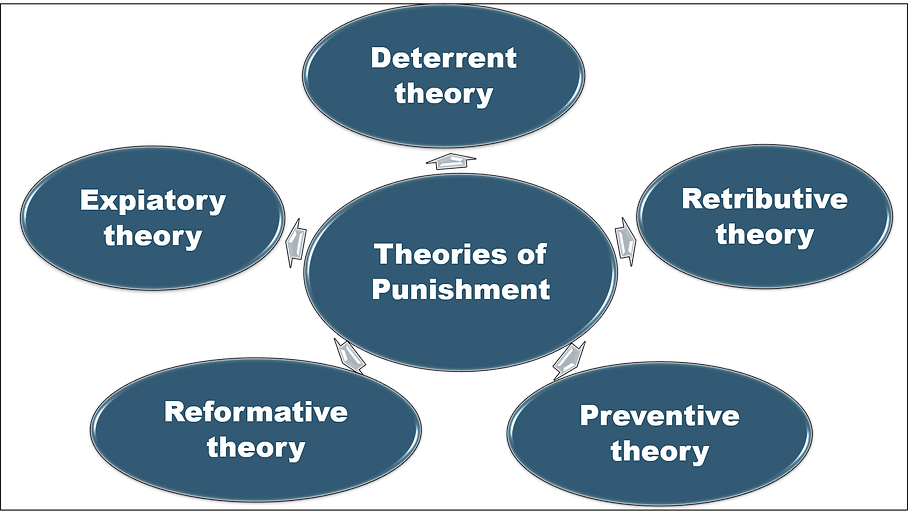Introduction
Punishment is a crucial aspect of any legal system, designed to maintain order and deliver justice. Among the various theories of punishment, the retributive theory stands out due to its focus on moral responsibility and proportionality. Unlike other theories that look forward to future outcomes, retributivism is backward-looking, concentrating on the crime committed and the deserved punishment. This post provides a comprehensive analysis of the retributive theory, examining its core principles, advantages, criticisms, and comparisons with other punishment theories.

Core Principles of Retributivism
Retributivism is grounded in the idea of moral desert and proportionality. The theory asserts that individuals should be punished because they deserve it, based on their moral wrongdoing. The punishment must be proportionate to the severity of the crime, ensuring that justice is served by giving offenders their due.
Moral Desert
Retributivism operates on the premise that individuals who commit crimes are morally responsible for their actions. For instance, if a person intentionally steals, they are morally culpable and deserve punishment. This concept of moral desert is central to the retributive theory, as it justifies the imposition of penalties on wrongdoers.
Proportionality
The principle of proportionality is intertwined with the moral desert. Retributivists argue that the punishment should fit the crime, neither being too lenient nor excessively harsh. The severity of the punishment should reflect the seriousness of the offence, ensuring that justice is both fair and balanced.
Also Read: Theories Of Punishment
Forms of Retributive Punishment
Retributive punishment can take various forms, each emphasizing different aspects of justice:
Payback
This form of punishment is akin to the ancient lex talionis, or “an eye for an eye.” The idea is that the offender should suffer in proportion to the harm they have caused. For example, a thief should not only return the stolen goods but also endure a penalty equivalent to the suffering they inflicted on the victim.
Annulment
Another perspective within retributivism is the annulment of the crime’s impact. This view, supported by philosophers like Hegel, posits that punishment serves to negate the criminal’s denial of the victim’s rights. By punishing the offender, society reaffirms the victim’s value and restores the moral balance disrupted by the crime.
Unfair Advantage
Some retributivists focus on the unfair advantage gained by criminals through their illegal actions. Punishment, in this sense, aims to remove this advantage, ensuring that offenders do not benefit from their wrongdoing. For instance, a person who commits fraud should not only face legal penalties but also lose any ill-gotten gains.
Advantages of Retributive Theory
Retributive theory has several strengths that make it a compelling approach to punishment:
Emphasis on Justice: Retributivism ensures that only those who are guilty are punished, thereby upholding the principle of justice. Innocent individuals are protected from wrongful punishment, as retributivism requires clear proof of guilt before any penalty is imposed.
Moral Clarity: The theory provides moral clarity by linking punishment directly to the crime. It sends a clear message that wrongdoing will be met with appropriate consequences, reinforcing societal norms and values.
Proportionality: By focusing on proportionality, retributivism prevents excessively harsh or lenient punishments. This ensures that justice is fair and that offenders receive penalties commensurate with their crimes.
Criticisms of Retributive Theory
Despite its strengths, the retributive theory is not without its criticisms:
The subjectivity of Morality: The concept of the moral desert is inherently subjective, as different societies and individuals have varying views on what constitutes moral wrongdoing. This subjectivity can lead to inconsistencies in the application of punishment.
Amoral Crimes: Retributivism struggles with crimes that are illegal but not necessarily immoral, such as minor traffic violations. Since these acts do not involve moral culpability, it is challenging to justify proportional punishment under retributive principles.
Resistance to Mercy: Retributivists often find it difficult to incorporate mercy and pardons into their framework. The rigid focus on the desert can lead to an inflexible approach to justice, where the potential benefits of leniency or rehabilitation are overlooked.
Comparison with Other Theories
Retributive theory is often contrasted with other punishment theories, such as deterrence, rehabilitation, and restorative justice:
Deterrence Theory
Deterrence focuses on preventing future crimes by imposing penalties that discourage criminal behaviour. Unlike retributivism, which is backwards-looking, deterrence is forward-looking, aiming to influence potential offenders rather than solely punishing past actions.
Rehabilitation Theory
Rehabilitation seeks to reform the offender and reintegrate them into society as a law-abiding citizen. Retributivists criticize this approach for being overly idealistic and for potentially undermining the principle of proportional punishment.
Restorative Justice
Restorative justice emphasizes repairing the harm caused by crime through reconciliation between the victim, offender, and community. While this approach promotes healing, retributivists argue that it fails to address the need for proportional punishment and moral accountability adequately.
Conclusion
The retributive theory of punishment offers a compelling approach to justice by emphasizing moral responsibility and proportionality. However, it is not without its challenges, particularly in dealing with the subjectivity of morality and the need for flexibility in certain cases. By understanding the strengths and weaknesses of retributivism, we can better appreciate its role in the broader landscape of criminal justice.
FAQs
What is the retributive theory of punishment?
The retributive theory of punishment is a justice approach that emphasizes punishing offenders based on their moral wrongdoing, ensuring that the punishment is proportional to the crime committed.
How does retributivism differ from deterrence theory?
Retributivism focuses on punishing past crimes based on the moral desert, while deterrence theory aims to prevent future crimes by imposing penalties that discourage criminal behaviour.
What are the criticisms of the retributive theory?
Criticisms of the retributive theory include its subjectivity in defining moral desert, challenges in addressing amoral crimes, and resistance to incorporating mercy and pardon into its framework.
Also Read: Deterrent Theory
Reference: lawctopus.com